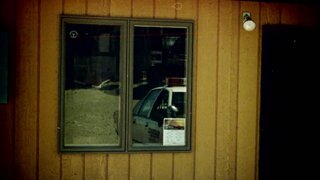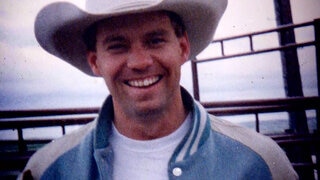Create a free profile to get unlimited access to exclusive videos, breaking news, sweepstakes, and more!
Did A Bitter Breakup Cost A Montana Veterinarian His Life?
Bryan Rein was discovered dead in the kitchen of his Montana bunkhouse on July 14, 1996, but determining who killed the veterinarian would prove more complicated than anyone could have anticipated.
By all accounts, Tom Jaraczeski didn’t take his breakup well.
When his high school sweetheart of four and half years delivered the crushing news that their romance was over — just before she started to date a handsome new veterinarian in the small Montana town of Geraldine — Jaraczeski just couldn’t let it go, according to "Dateline: Secrets Uncovered," airing Wednesdays at 8/7c on Oxygen.
He started calling former girlfriend Ann Wishman and her new love interest, 31-year-old Bryan Rein, repeatedly and hanging up. He burst into Rein’s home in the middle of the night while Wishman had been sleeping over to ask Rein his intentions.
Jaraczeski threw a rock through Rein’s veterinary clinic window, snuck into Wishman’s home while the family was away and read her journal and then later quoted it back to her, and showed up again at Rein’s remote bunk house in the middle of the night claiming to have car trouble and asking to use the veterinarian’s phone, according to “Dateline: Secrets Uncovered.”
So, when Rein was discovered dead with three bullet wounds in him in the kitchen of the bunkhouse on July 14, 1996, Jaraczeski seemed like an obvious suspect.
The case, however, wouldn’t be that straightforward. The crime scene had been compromised by inexperienced sheriff’s deputies who, believing it was a suicide, mopped up blood at the crime scene with towels, threw the handset of a phone discovered under Rein’s body in the trash, and failed to collect any DNA or fingerprint evidence.
By the time Agent Ken Thompson of Montana’s department of criminal investigation arrived at the scene on July 15, 1996 some of the discarded items were beyond recovery.
“My partner and I looked at each other and thought, ‘Oh my lord,’” Thompson recalled to "Dateline" correspondent Keith Morrison of the compromised crime scene. “It certainly makes things very difficult.”
Investigators believed Rein had been confronted by his killer just outside the single wide trailer he had been living in while trying to establish his veterinary practice, after deputies reported finding one discarded water shoe on the bunkhouse doorstep. The other shoe had been securely on one of Rein’s feet.
An autopsy would reveal the 31-year-old had abrasions and contusions on his head and a swollen right eye, suggesting there had been a struggle before his death. He had also been shot twice in the lower right firearm. There had been another fatal shot to the chest.
But the one thing the pathologist wasn’t able to determine was when Rein died.
Investigators knew he had been killed some time after returning home from a conference in Bozeman on Friday evening. Wishman, who was just 21 years old at the time, told authorities that she had spoken with Rein one final time on the phone around 10:15 that night before when the phone call abruptly ended.
“All of a sudden he was like, ‘Well, I’ve got to go’ and before I could say goodbye he hung up,” she recalled to “Dateline: Secrets Uncovered.” “I thought it was kind of weird, but you know, it was late. I didn’t want to read too much into it at the time.”
It was the last time anyone ever spoke to Rein.
He was discovered dead Sunday by his landlord, but investigators couldn’t be sure whether he had died Friday night or some time on Saturday.
While Jaraczeski admitted to “Dateline: Secrets Uncovered” that he had “no alibi” for Friday night, there was another potential suspect who was unable to provide an alibi for Saturday.
There had been rumors that Rein’s close friend Larry Hagenbuch had been badmouthing Rein at a local bar before his death — a claim which Hagenbuch has denied. Hagenbuch had also been in a dark place at the time. His wife was leaving him, he had been drinking too much and even tried to die by suicide using animal medication he’d gotten from Rein.
Rein also seemed to know details of the crime scene that had not been made public, but Thompson was quick to point out that his story about the scene changed frequently.
“We looked at him very seriously,” Thompson said.
Both men denied killing Rein.
As for the hang-up calls and stalking, Jaraczeski insisted he had just been trying to work through his feelings about losing the woman he once felt was “the one” and admitted his behaviors — like sneaking into Wishman’s home to read her diary — had been over the top.
“It was wrong of me to do that,” he told Morrison. “I wanted to see her thoughts, what she had to say about me, what she had to say about Bryan.”
He insisted he had “no ill feelings toward Bryan” and said he was “scared to death” when investigators came knocking on his door to ask him about the murder.
But some, like his ex-girlfriend, weren’t buying his story and believed that Jaraczeski had killed Rein in a fit of jealous rage.
“I felt like if it wasn’t for me, none of it would have ever happened,” Wishman said of the guilt she still feels.
Then in 1998, Jaraczeski was arrested for the murder. But he had the support of his state appointed defense attorney Bob Peterson.
“When I met him I knew that he couldn’t have done it,” Peterson said. “I’ve represented hundreds and hundreds of people and you get a sense of people and I got a sense of Tom and I was pretty sure that he hadn’t done it and so then as the evidence started rolling I became very certain that he wasn’t the one.”
There was no physical evidence connecting Jaraczeski to the crime — only the circumstantial evidence of those phone calls, the stalking, and the lack of an alibi for Friday night. Investigators also believed that a bloodhound named Calamity Jane linked Jaraczeski to the crime, after she was able to track his scent to an area not far from where investigators discovered the case to Rein’s gun, which had been used in the crime.
But the charges against Jaraczeski were dropped without prejudice when the evidence surrounding the dog was thrown out in court, after it was revealed that the dog and handler were not properly certified.
Believing the allegations were behind him, Jaraczeski went on with his life. He moved to South Dakota, got married, and had a couple of children.
Then, 13 years after Rein’s murder, Brant Light, a chief prosecutor for Montana’s Attorney General’s Office, was appointed to a new job handling cold cases and decided to take a new look at the case. Four years later, Jaraczeski was arrested again and this time he went on trial. The case remained circumstantial with no direct physical evidence linking Jaraczeski to the crime.
Peterson once again set about to vigorously defend his client alongside Jennifer Streano.
Prosecutors argued that Rein had been killed in a premediated murder — meticulously planned by Jaraczeski to take out his romantic rival — but a jury was not convinced and in September 2015 Jaraczeski was found not guilty of deliberate homicide.
“I cried. I put my head down on the table and I cried,” Jaraczeski recalled the “sense of relief” he felt after hearing the verdict.
Rein’s murder remains unsolved to this day.


































